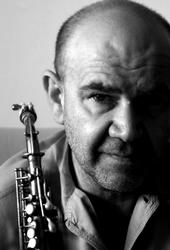João began his music studies at the age of 10 – piano at the age of 18.
He finished his forth year at the School of Architecture - in Lisbon, and proceeded with a career in both realms, as a musician and as architect, for the following eight years. As a musician on the saxophone, he is self-taught, having developed over time his own individual musical language.
In 1990 he participated in the 14th annual – Gulbenkian Contemporary Music Encounters – dedicated that year to composer Karlheinz Stockhausen.
He also, for that occasion, was acting journalist for the magazine – MIT.
Also in 1990, he performed in the closing cerimonies for the “V Jornadas Internacionais de Música Contemporânea†(Fifth International Contemporary Music Encounters in Oporto – hosted by ‘Oficina Musical’ – under the direction of Prof. Ãlvaro Salazar) with the quartet “Três por Quatroâ€. He also performed in the VII annual Jazz Festival of Macau with the group – KAF (Kinteto António Ferro), having in that year, recorded the group’s CD entitled “Crepúsculo do Vinhoâ€. This ensemble gave way to (set forth a path for) a new and original – groundbreaking – way to perform Portuguese Popular Music.
He has performed in various ensembles and with a number of musicians including: Steve Potts, Didier Lockwood, and Christian Escoudé. He also played in the ‘Forum Picoas – Performances’ alongside António Vitorino de Almeida, and in many Art Exhibits.
Among his encounters with theatre arts he, in partenership with Carlos Azevedo, was awarded the Music Prize by the Polish Government for “Diário de um Louco†– work by Andrej Kowalski (this work having been awarded that year for ‘Best Stage Direction’ – written by Nicolaus Gogol, stage direction by A Kowalski).
In 1993, along with Carlos Curto, he created the music (and performed - live) for the year’s hit play “INOX take five†– a play starring José Pedro Gomes and António Feio. As a result of this partnership, he entered the multi-media project called “ Da Bélio-câ€. This group’s first venture was – “E há … o Silêncio†(and there is … Silence) – with written text by Jean Cocteau; and in 1997 / 1998 concert/performances under the name – “Gogâ€.
He also actively participated in conceiving the music of film sound tracks. Among these is – “O Judeu†(Jew) by Tom Azulai.
He played with Carlos Mendes for a full season at the ‘Teatro Nacional’ music with poems penned by Portugal’s great poets.
He further participated in a number of African music recordings, of which stands out “Reencontroâ€. This is a recording of Cape Verde’s poet & singer – Djurumani (J. P. Courinha having been the musical director for this artist’s performances).
He performed music refreshingly original in nature, being one of three musicians in a group based on Carlos Paredes’s work, alongside João Bengala and Luisa Amaro.
In 1998, with Carlos Curto, he wrote the music to Gertrude Stein's Geography and Plays, having Ana Tamen undertaken the stage-direction of the work for ‘Culturgest’. He made the orchestrations, and was musical director for the Opera “Sete Pecados Mortais†(The Seven Deadly Sins) – by Kurt Weill – for the “Festival dos 100 dias da Expo 98†(Expo 98’s 100 day Festival).
In this same year he took part in performances: “Vasco da Gama / Alentejoâ€, and in the closing cerimonies of Expo 98 with Genoveva, Coral Vertice, “Sons do Tempo†String Quartet, Alexandre Baterias and “Quarteto de Saxofones de Amesterdão (Amsterdam Saxophone Quartet).
In 1999, in collaboration with “Coral Verticeâ€, he took part in a series of experimental concerts in churches. This work was based upon sacred music written for choirs - between the X th and the XVIII th Centuries.
He co-founded the group “Kirie†- “reflection on the search for ‘universals’ in music and musical languageâ€. With this group he performed at the ‘Brugges Music Festival’.
Pimp My Profile
